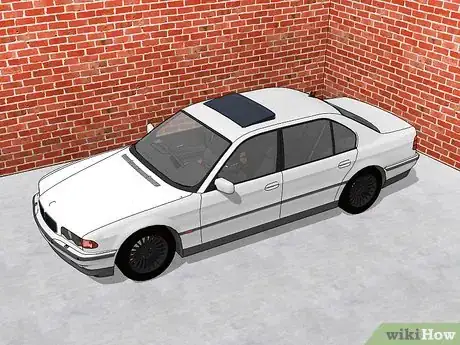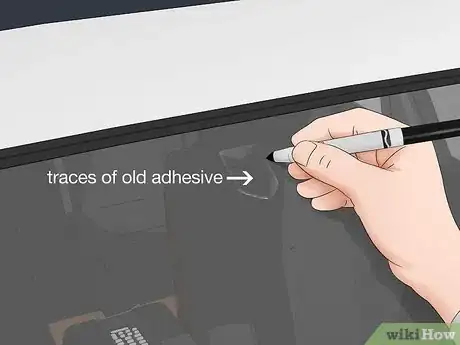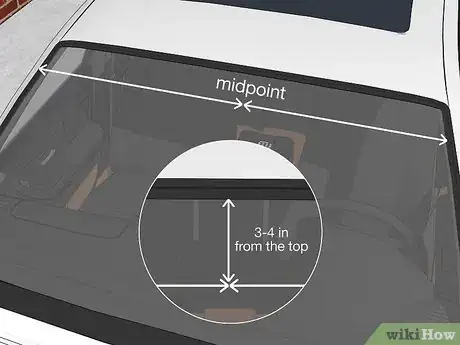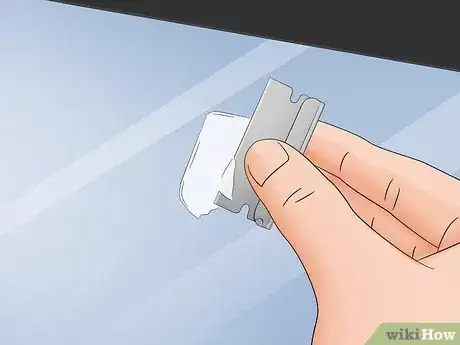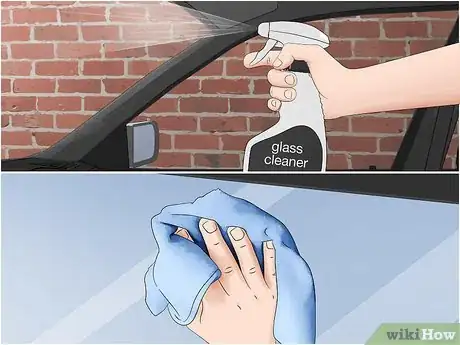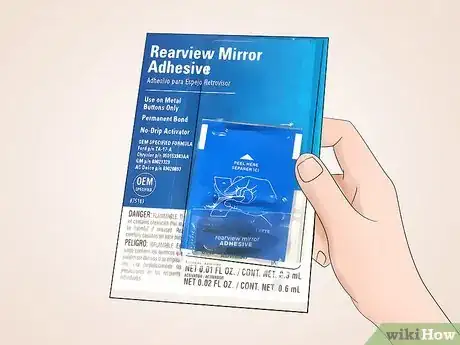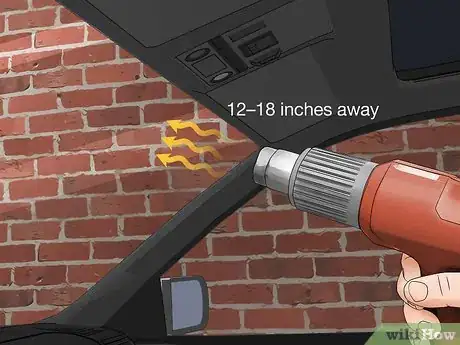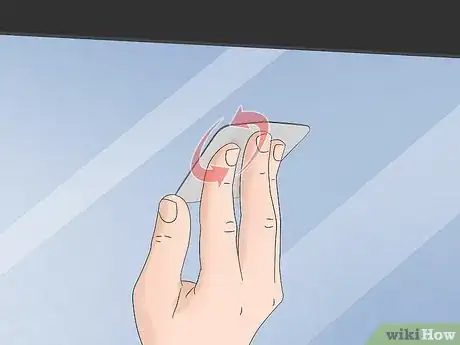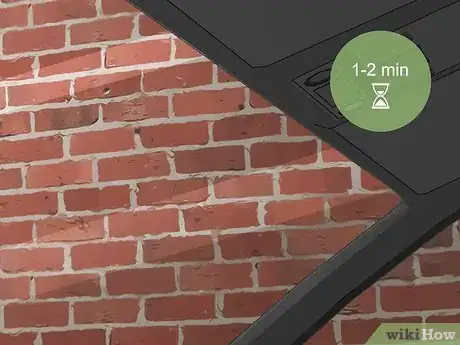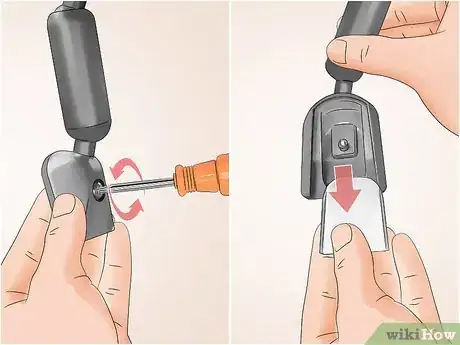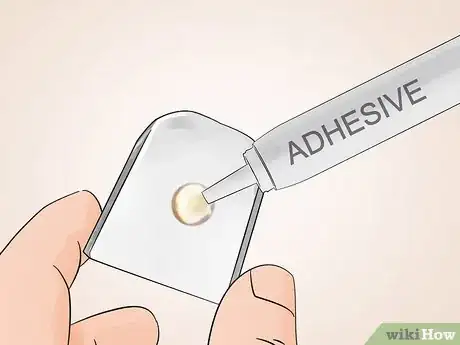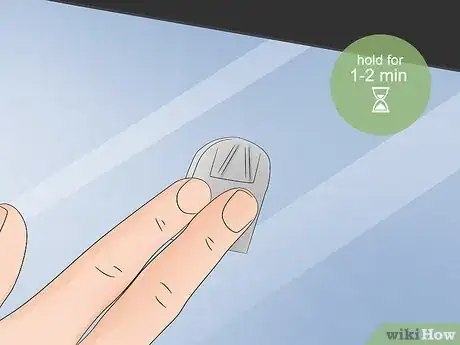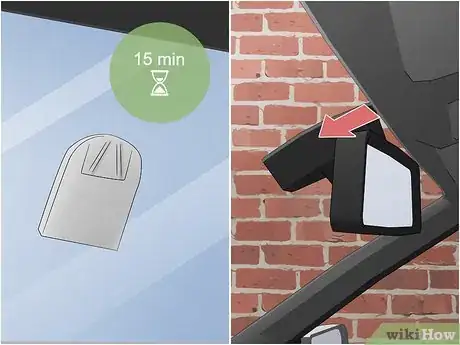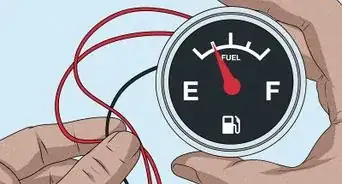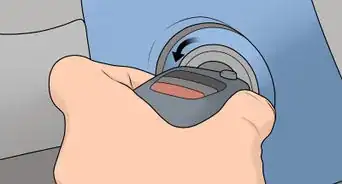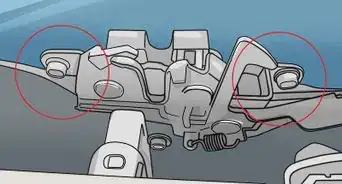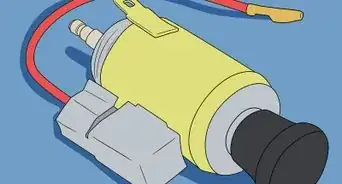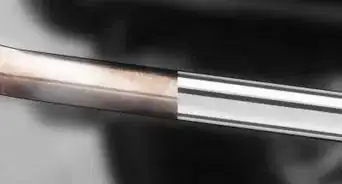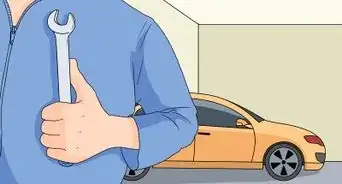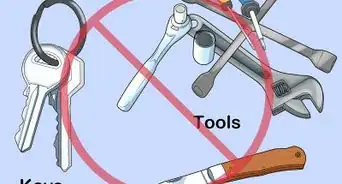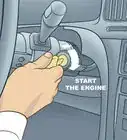This article was co-authored by wikiHow Staff. Our trained team of editors and researchers validate articles for accuracy and comprehensiveness. wikiHow's Content Management Team carefully monitors the work from our editorial staff to ensure that each article is backed by trusted research and meets our high quality standards.
There are 11 references cited in this article, which can be found at the bottom of the page.
This article has been viewed 13,797 times.
Learn more...
A detached rear view mirror may not seem like a big deal, but driving without one greatly increases your risk of being involved in an accident or getting slapped with a ticket for unsafe driving. No need to stress, though—you don’t have to be a trained mechanic or blow half your paycheck to get a fallen mirror back in its proper place. All you need is the right adhesive and about half an hour.
Steps
Marking and Cleaning Your Windshield
-
1Perform your repairs outside or in an open garage. If the weather is hospitable, find a nice dry place to park your vehicle while you work. Otherwise, open the door to your garage to get some air circulating. This will not only keep your workspace ventilated but also cut down on the amount of time the adhesive needs to dry.[1]
- Many industrial-strength adhesives are made with chemicals that could be hazardous to breathe in concentrated doses.
-
2Mark your mirror’s placement on the outside of your windshield. This will be easy if there are still traces of the old adhesive remaining at the original attachment site—just use a grease pencil, a dry-erase marker, or a dark-colored crayon to draw a faint outline around the area. Any of these tools will show up nicely on glass and be easy to remove once you’re finished with your project.[2]
- A few strips of masking tape can also serve as a handy visual aid.
- Take the time to examine the adhesive in detail and do your best to map out the site as precisely as possible using the existing contours.
- This step may not be necessary if you’ve bought your vehicle within the last decade or so. The windshields of newer automobiles often have thin black bands printed on the exterior that indicate the correct position for the rear view mirror mounting bracket.
Advertisement -
3Measure the windshield if you’re uncertain where your mirror needs to go. In some instances, there may not be enough adhesive left to be of use. If this is the case, grab a tape measure and find the midpoint of the upper portion of the windshield, then measure 3–4 inches (7.6–10.2 cm) down from the headliner. Draw a large ‘X’ at this location with your pencil or tape.[3]
- Feel free to play around with the positioning of your mirror to put it at a more natural viewing angle. It can help to hold up the detached mirror for reference while you do so.
-
4Scrape off any leftover adhesive on the windshield with a razor blade. Hold the edge of the blade against the glass at an angle and push it along using short, light strokes to dislodge the stubborn, hardened residue. This may take a while, depending on how much adhesive you’re up against, so be patient and work carefully.[4]
- You shouldn’t have to worry about the razor blade leaving scratches on your windshield, provided you’re not digging too hard.
Tip: It goes without saying that razor blades are extremely sharp. If you have a thick pair of work gloves lying around, consider pulling them on to protect your hands. You might also look for a similar scraping device that has its own safe gripping surface.[5]
-
5Clean your intended mounting site thoroughly with a streak-free glass cleaner. Hit the area with a couple spritzes and go over it with a soft microfiber towel or paper towel until it’s totally free of dust and grime. If you decide to use a paper towel, make sure it’s not the cheap kind that leaves tiny bits of paper behind. These particles could interfere with the adhesive’s ability to cure properly.[6]
- Assuming you’re fresh out of glass cleaner, a clean cloth or paper towel dipped in rubbing alcohol will also do the trick, as will warm water and a squirt of mild liquid dish soap.[7]
- The adhesive needs to have a perfectly clean, smooth surface to stick to in order to make a durable connection.
Applying the Adhesive Activator
-
1Pick up a rear view mirror repair kit at your local auto supply store. You can purchase one of these kits for just a few dollars at most establishments. They typically contain a powerful adhesive and a small tube of activator solution, which helps the adhesive bond faster. For lasting security, you’ll need to use both of these substances on your mirror’s main attachment sites.[8]
- Some mirror repair kits include an activator in the form of a towelette that doubles as a cleaning cloth for quicker, easier application.[9]
- Don’t waste your time with ordinary super glues, epoxies, and other nonspecific adhesives. They won’t be strong enough to hold the mirror in place, at least not in the long-term.
-
2Use a heat gun or hair dryer to gently warm up the glass. Set your heating implement to its lowest heat setting, then hold it 12–18 inches (30–46 cm) away from the windshield’s interior surface and wave it back and forth for 20-30 seconds. This should be plenty of time to raise the temperature of the glass enough to ensure a rock-solid bond.[10]
- If you’re not in any particular hurry, you also have the option of simply leaving your vehicle sitting in direct sunlight for a few hours.
- It’s especially important to warm up your windshield gradually if it’s cold to the touch. Exposing cold glass to intense heat could produce condensation, which will render the adhesive ineffective, or even cause it to crack.
-
3Spray or wipe the activator solution onto the mounting site. If your mirror repair kit came with a spray-on activator, spray the recommended amount directly onto the windshield. If it came with a towelette, use it to wipe the glass all around the site where the mirror’s mounting bracket will connect.[11]
- Try not to let any of the solution come into contact with your skin, as it could cause minor irritation. Combination cleaner-activator towelettes tend to come in pull-apart pouches that allow you to grip the packaging rather than the pad itself.
Tip: For best results, some manufacturers recommend putting a little activator on the back of the mirror mounting bracket, as well.[12]
-
4Let the activator sit on the glass for 1-2 minutes. Make sure that your windshield is completely dry before you move on. Remember, the adhesive won’t be able to do its job if there’s moisture on the surface.[13]
- Avoid touching the glass for any reason while you’re waiting for it to dry. The oils on your skin can also weaken the grip of the adhesive.
Re-Attaching Your Mirror
-
1Remove the tab-like mounting bracket from the detached mirror. You’ll find the mounting bracket on the rear side of the small arm that supports the actual mirror unit. To extract it, simply loosen the locking screw holding it in place with a Phillips-head screwdriver or Allen wrench and slide it out of its housing slot.[14]
- If you notice any adhesive residue clinging to the mounting bracket on the lower part of your mirror, use your razor blade to scrape it off.[15]
- The mounting bracket is also sometimes referred to as the “tab” or “button,” so don’t be confused if you see one of these terms in the instructions written for the repair kit you’re using.
-
2Dab a small amount of adhesive onto the back of the mounting bracket. Exact application methods can vary somewhat between products, but it usually doesn’t take more than one or two drops. Try to concentrate the glue around the center of the bracket—that way, it will be less likely to squish out the sides when you press it against the glass.[16]
- Most mirror repair adhesives are designed to dry quickly, so be prepared to hustle once you’ve applied it to the bracket.
- Be careful not to get any glue on your skin, either, unless you like the idea of having gritty fingertips.
-
3Press the bracket into the windshield firmly and hold it for 1-2 minutes. Apply steady pressure, being careful not to let the piece shift, slide, or pull away from the glass. Keep an eye on the clock so you’ll know how much time has elapsed. The longer you hold the bracket, the more securely it will bond.[17]
- Don’t obsess over getting the mounting bracket perfectly square. You can always adjust the mirror as needed later, and chances are no one but you will notice, anyway.
-
4Let the adhesive set for at least 15 minutes before mounting your mirror. You could even wait up to an hour if you want to make absolutely sure that it won’t go anywhere. When time is up, just slide the mirror back into place around the bracket and re-tighten the locking screw with your screwdriver or Allen wrench. That’s all there is to it![18]
- If you attempt to put your mirror back on too soon, it may fall right back off.
Tip: To speed things along a bit, blast the area around the mounting bracket with some warm air from your heat gun or hair dryer.
Things You’ll Need
Preparing Your Windshield
- Grease pencil or masking tape
- Razor blade
- Glass cleaner
- Microfiber towel
- Heat gun or hair dryer
- Rubbing alcohol (optional)
- Warm water and mild liquid dish soap (optional)
- Soft, lint-free cloth or non-shedding paper towel (optional)
- Protective gloves (optional)
Applying the Adhesive Activator
- Rear view mirror repair kit
- Heat gun or hair dryer (optional)
Re-Attaching Your Mirror
- Rear view mirror repair kit
- Phillips-head screwdriver or Allen wrench
- Razor blade (optional)
- Protective gloves (optional)
References
- ↑ https://www.popularmechanics.com/cars/how-to/a87/1272426/
- ↑ https://www.youtube.com/watch?v=sZ03Qv9dIgo&feature=youtu.be&t=147
- ↑ https://www.popularmechanics.com/cars/how-to/a87/1272426/
- ↑ http://knowhow.napaonline.com/how-to-fix-a-rearview-mirror/
- ↑ https://www.ccohs.ca/oshanswers/safety_haz/sharp_blades.html
- ↑ https://www.topgear.com.ph/features/tip-sheet/how-to-clean-windshield-a4354-20190628
- ↑ https://www.youtube.com/watch?v=g0U6bBOD2mk&feature=youtu.be&t=33
- ↑ https://www.youtube.com/watch?v=UPzPOXm8Zkc&feature=youtu.be&t=10
- ↑ https://www.thedrive.com/reviews/28508/best-rear-view-mirror-glues
- ↑ https://www.popularmechanics.com/cars/how-to/a87/1272426/
- ↑ https://www.youtube.com/watch?v=UPzPOXm8Zkc&feature=youtu.be&t=122
- ↑ https://www.youtube.com/watch?v=UPzPOXm8Zkc&feature=youtu.be&t=126
- ↑ http://knowhow.napaonline.com/how-to-fix-a-rearview-mirror/
- ↑ https://www.youtube.com/watch?v=UPzPOXm8Zkc&feature=youtu.be&t=32
- ↑ https://www.popularmechanics.com/cars/how-to/a87/1272426/
- ↑ https://www.popularmechanics.com/cars/how-to/a87/1272426/
- ↑ http://knowhow.napaonline.com/how-to-fix-a-rearview-mirror/
- ↑ https://www.popularmechanics.com/cars/how-to/a87/1272426/
